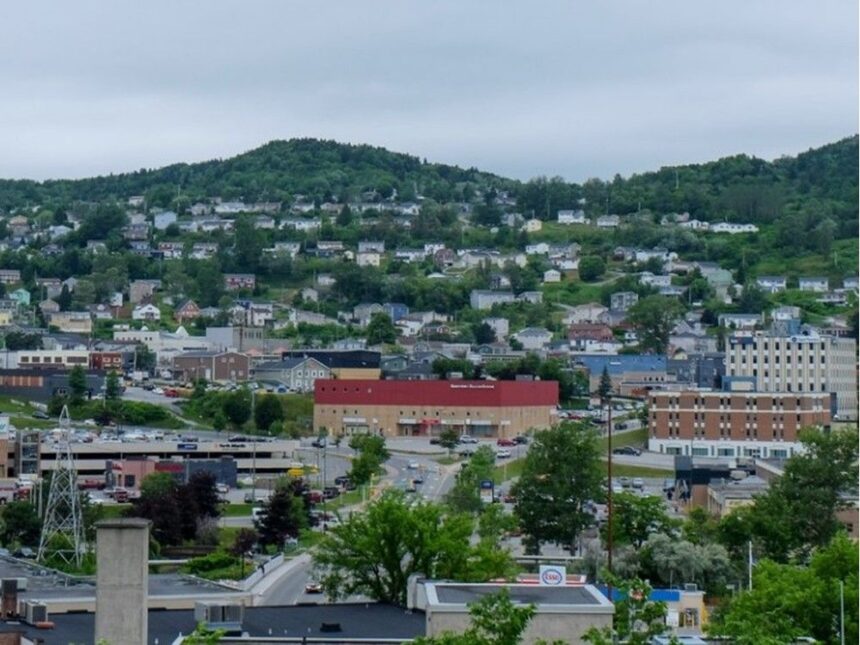“We have not very well transitioned from what I will call the old economy,” says John DavisPublished Sep 29, 20258 minute readThe City of Corner Brook. CONTRIBUTEDArticle contentJohn Davis spent 30 years working with the provicial government in the business and industry department. When he retired, he took the position as CEO of Qalipu Holdings, the business arm of the Qalipu First Nation.THIS CONTENT IS RESERVED FOR SUBSCRIBERS ONLY.Subscribe now to access this story and more:Unlimited access to the website and appExclusive access to premium content, newsletters and podcastsFull access to the e-Edition app, an electronic replica of the print edition that you can share, download and comment onEnjoy insights and behind-the-scenes analysis from our award-winning journalistsSupport local journalists and the next generation of journalistsSUBSCRIBE TO UNLOCK MORE ARTICLES.Subscribe or sign in to your account to continue your reading experience.Unlimited access to the website and appExclusive access to premium content, newsletters and podcastsFull access to the e-Edition app, an electronic replica of the print edition that you can share, download and comment onEnjoy insights and behind-the-scenes analysis from our award-winning journalistsSupport local journalists and the next generation of journalistsRegister to unlock more articles.Create an account or sign in to continue your reading experience.Access additional stories every monthShare your thoughts and join the conversation in our commenting communityGet email updates from your favourite authorsSign In or Create an AccountorArticle content“For most of my career, I’ve been in and around that whole area of business and industry development,” he told The Telegram.Article contentArticle contentWith the municipal election coming, the Corner Brook resident and “life-long armchair politico” has been using his knowledge to write a series of articles that he’s posted on Facebook focused on improving the city’s economic position.Article contentArticle content“When I was working in those other organizations, I never felt comfortable in saying anything publicly, because you do represent specific interests of your employer, and it’s not always the most comfortable place to be too visible, out in social media.Article content“Now I’m no longer encumbered,” said Davis, who has lived his entire life in Corner Brook.Article content John Davis CONTRIBUTEDArticle contentThe articlesArticle contentDavis’s articles are long, but he said that was intentional.Article content“It’s hard to tell the story in two paragraphs, and for the most part, my audience really were those that were running as opposed to any kind of a general public.”Article contentDavis said the whole idea of writing the articles was to hopefully have some kind of influence with council hopefuls.Article contentHe said the posts were not meant to be something negative; rather, he said, they’re intended to be as realistic as possible. He said he’s received some good feedback from candidates and the public.Article contentArticle content“So, at least they’re listening and maybe there’s some food for thought in my comments there,” he said.Article contentArticle contentEnough so that he’s been asked why he isn’t running for council.Article contentHis answer is that at age 68 and being out of the workforce, he doesn’t have any interest in elected politics at any level.Article contentArticle contentWhat are the problems in the city when it comes to economic success?Article content“I can remember what it was like back in the heyday,” said Davis.Article contentCorner Brook was once clearly the second city in Newfoundland, and is now seen as kind of a big rural town, he said.Article content“We have not very well transitioned from what I will call the old economy. Back in the day, we had a very heavy industrial base here in the Corner Brook area,” he said.Article contentThe city’s paper mill under Bowaters was a larger operation than it currently is under Kruger. There was a cement and gypsum plant and large-scale factories that processed agricultural products. Companies like Lundrigans operated on the international stage.Article content“We lost virtually our entire industrial base in the period of 10 to 15 years, and there was no transition really away from that into something different or into something new,” said Davis.Article contentArticle contentThat had an impact on the city, which has seen its population decrease.Article contentTo change all that, Davis said the city needs to retool the local economy.Article contentHow do you do that?Article content“In 2025, when you talk about an industry base, really, you’re talking about technology. The days of mining, forestry and fishery as primary industrial development, those days are really gone,” he said.Article contentIn his articles — so far, there have been four — Davis has highlighted the fact that Corner Brook is the only other community in the province that’s lucky enough to have a post-secondary degree-granting institution where you’re able to build out that technology base.Article contentArticle content“If you look at right across Atlanta Canada, if you look at every province in the country, every state in the U.S., in Europe, wherever, where you have the highest income and the highest levels of employment and the highest professional class of people that drive your economy, is always around a university that’s focused on some level of R&D (research and development). That’s just a common thing today in this day and age.”Article contentThe reason industry locates in places like St. John’s, Halifax, Moncton or larger centres across the country, he pointed out, is because generally there is some kind of very specific research and development capacity located there that’s sector specific.Article contentIn St. John’s, it’s around cold ocean research and oil and gas.Article content“So, that’s the actual industry. Companies will actually locate and invest in areas where that R&D capacity exists,” said Davis.Article content“That’s the area where we would have a bit of an advantage, and I’ve kind of outlined in some of my articles that I think the advantage for us would be in renewable energy.”Article contentIt’s the next big thing here in this province, he said, with wind energy, hydrogen production.Article content“Those industries are kind of in a bit of a low ebb right now, but it won’t stay like that. That is the wave of the future, and certainly with Labrador energy, the R&D and whatever with that will automatically end up in St. John’s and Montreal if we don’t do anything at all,” he said.Article content Grenfell Campus in Corner Brook. Photo by Diane Crocker /THE TELEGRAMArticle contentThe universityArticle contentAs a case in point, Davis said a few decades ago, Cape Breton was hit hard with the shutdown of its steel manufacturing sector.Article contentAt the time, what is now Cape Breton University was a non-degree-granting college.Article contentThe college was retooled into a degree-granting university and is focused on environment and climate change, Davis points out.Article contentArticle contentIn 2024, he said, the university secured around $85 million to build a new research and development facility.Article contentIt’s also seen an increase in enrollment and a campus that, 20 years ago, was the size of Grenfell Campus now has over 9,000 students.Article content“What you’re seeing in the Sydney area is a whole bunch of high-tech companies setting up. So, that’s the model. It can be done at a small community level, but the key thing is you’ve got to retool your university,” she said.Article contentThere have been attempts to expand Grenfell Campus to give it full autonomy over the years that have failed.Article contentDavis said it is the single largest asset that the city has in its backyard and could really transform the economy long-term.Article contentHis fourth post presented a bit of an image of where the city could be in 15-20 years, and he said it really all stems from retooling the university.Article contentArticle contentDavis said tertiary industries — like retail, service and, tourism — are really important, but will plateau.Article content“And then they won’t go beyond that if you don’t have some kind of an industry base that pumps the money into the economy to grow it to the next level.”Article content Marble Mountain. CONTRIBUTEDArticle contentMarble MountainArticle contentThat’s been seen with Marble Mountain and some other initiatives in the area over the last 25-30 years, he added.Article content“In that 30 years, if our population, as an example, had doubled, we had a lot more money jingling around in the economy, Marble Mountain wouldn’t be just kind of a base operation for 10 weeks of the year as it is now,” he said.Article contentDavis served on the Marble Mountain board for 27 years before he left government in 2017 and was part of a bunch of privatization efforts going back to the ’90s and through the 2000s that went nowhere — the same thing that has occurred with the recent efforts.Article contentHe believes that part of what happened is that there was no local control, as it was handled by the Department of Tourism in St. John’s.Article content“They probably don’t have the same vested interest in that as you would if it had been more local control,” he said.Article contentDavis said the things he’s talked about could be major drivers that could transform the local economy.Article content Corner Brook Pulp and Paper Ltd. in Corner Brook. Photo by Diane Crocker/THE TELEGRAM FILE PHOTOArticle content‘Be the advocate’Article contentDavis doesn’t believe it’s the city’s role to bring in or attract new business and industry.Article content“The roll of the city, it’s to be the advocate.”Article contentThat’s something he plans to talk about in his fifth and final article, which he says will be shorter and contain some things he hopes the new council will consider.Article content“Basically, what it will advocate is that the city automatically adopts a more business-focused approach to everything that they do. What I mean by that is I would like to see every single council meeting have a period of time set aside to talk about business development and what the city is doing.”Article contentArticle contentDavis said it could be on how the city is reducing regulations, or how it’s cutting through red tape.Article content“I would like to see some kind of a business advisory group that would advise the city on those things and be listened to, not just a token thing.Article content“I would like to see the city really start to build out its business development and tourism function within City Hall.Article content“So, there’s a hole, there’s a whole range of things. It doesn’t have to be 20 things they have to do, but basically change the focus,” he said.Article contentArticle contentArticle contentAnother perspectiveArticle contentDavis is not the only person trying to engage people about the future of the city. Local businessman Jamie Fowlow has also been posting some of his ideas on Facebook over the past couple of weeks.Article contentFowlow declined to be interviewed for this article.Article contentWhile some of his posts were fictional in nature — like the city doing a lottery for residential building lots — he did a post Sept. 22 that he said was a true offer to help.Article content“I would like to form and chair a volunteer group of local businesspeople to assist council in recognizing ways to help small business in our city, make it easier to start a business, and develop ways where our small business community can support each other,” he said.Article content“This group would also look at ways to jumpstart new housing starts, working with city officials to recognize opportunities for city-owned land or Crown land within city boundaries.Article content“I would also like to create and head a volunteer group to negotiate a deal for the city to take over the ownership of the Marble Mountain Development Corp.Article content“This would involve not only negotiating a deal, but developing a business plan to ensure it succeeds in turning back into a community-owned and supported facility,” said Fowlow.Article content
Corner Brook ‘armchair politico’ wants to see changes to improve future economy











